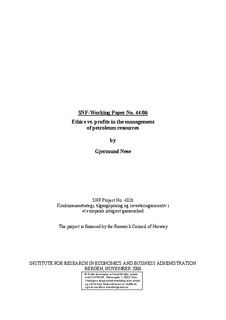Ethics vs. profits in the management of petroleum resources
Working paper

Åpne
Permanent lenke
http://hdl.handle.net/11250/166090Utgivelsesdato
2006-11Metadata
Vis full innførselSamlinger
- Working papers (SNF) [809]
Sammendrag
Many of the decisions made by policy makers today may affect not only the people belonging to the present generation, but can have long-term effects that reach far into the future and thus significantly affect the life of future generations. The social rate of discount, which is the way that future consequences often are evaluated in present-day decision-making, unavoidably raises difficult issues of inter-generational justice. Greenhouse gas emissions caused by the use of non-renewable energy sources like oil and natural gas is an obvious example involving both economical and ethical concerns. The discussion in this paper is further motivated by the increasing demand for energy and the fact that more and more of the energy sources needed to fulfill this demand seem to be located in environ-mentally vulnerable areas. Norwegian authorities are faced with such a dilemma when considering whether to increase the petroleum activity in the Barents Sea. The concern is that such activity may cause irreversible environmental damages to the Barents Sea area. Furthermore, the petroleum resources are non-renewable meaning that for each unit of oil and gas produced today there will be one unit less left in the ground for future generations, leading to a debate about income distribution between generations. This paper focuses on some of the economic and philosophical arguments surrounding the debate about how social decision makers of the present generations should value the consequences their decisions may have on future generations.
Utgiver
SNFSerie
Working paper2006:44